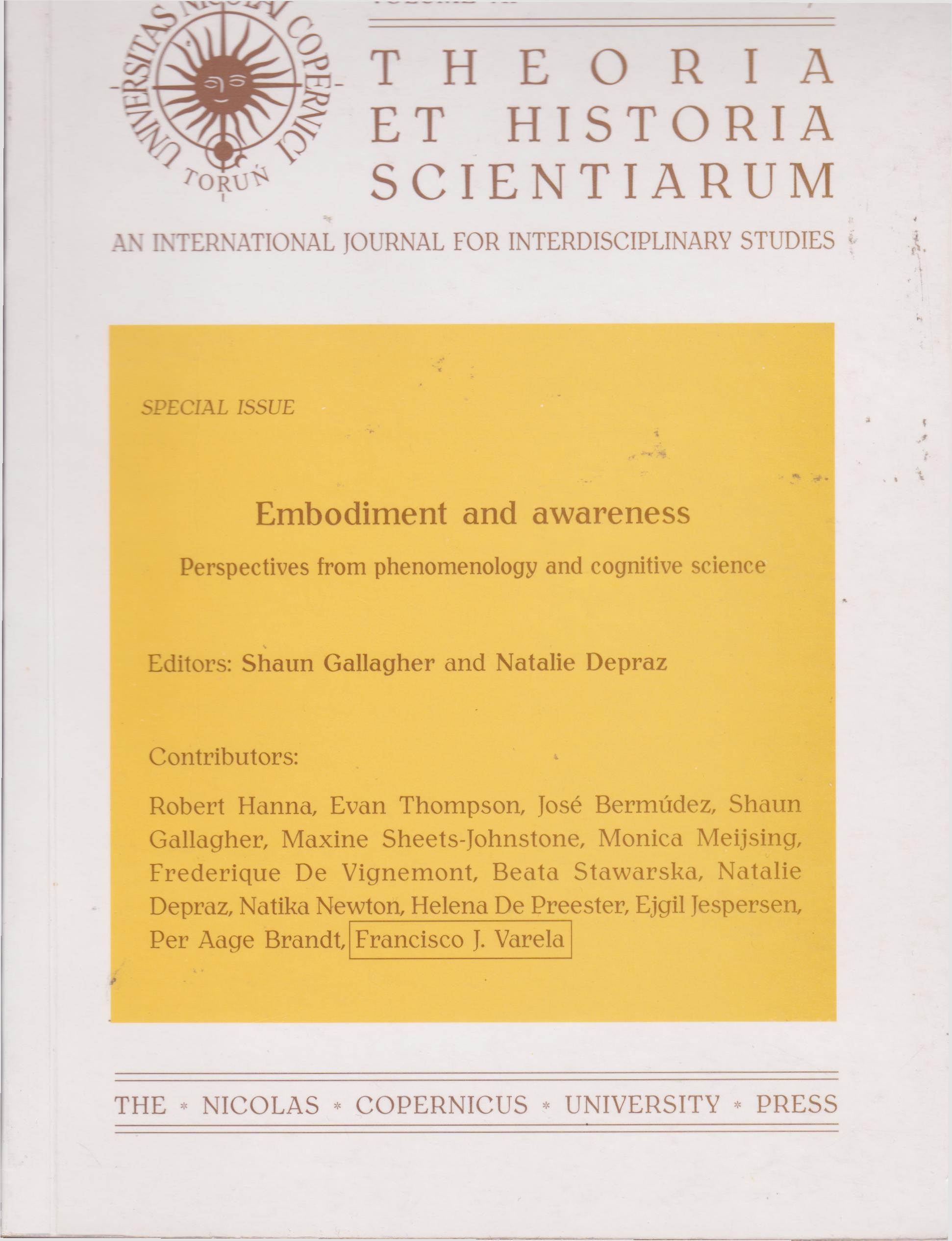The Mind-Body-Body Problem
DOI:
https://doi.org/10.12775/ths.2003.002Keywords
Mind-Body-Body Problem, consciousness, animalism, cognitive ethology, human embodiment, naturalistic dualismAbstract
The aim of this paper is to offer a solution to the Mind-Body-Body Problem. The solution, in a nutshell, is that the living and lived body (Leib) is metaphysically and conceptually basic, in the sense that one’s consciousness, on the one hand, and one’s corporeal being (Kórper), on the other, are nothing but dual aspects of one’s lived body. One’s living and lived body can be equated with one’s being as an animal', therefore, this solution to the Mind-Body-Body Problem amounts to an “animalist” version of the dual aspect theory. On this view, every conscious individual creature is literally identical with its living and lived body (Leib) or the animal that it is; in particular, each consciousReferences
Allen C. and Bekoff, M. Species of Mind (Cambridge, MA: The MIT Press, 1997).
Blakesee, S. and Ramachandran V. S., Phantoms in the Brain (New York: William Morrow, 1998), Chapters 2-3.
Block, N. “Troubles with Functionalism,” in Ned Block (ed.), Readings in Philosophy of Psychology, vol. 1, (Cambridge, MA: Harvard University Press, 1980).
Cassam, Q. Self and World (Oxford: Oxford University Press, 1997).
Chalmers, D. J. 1996. The Conscious Mind. New York: Oxford University Press, 1996
Chalmers, D. J. 1995. Facing Up to the Problem of Consciousness, Journal of Consciousness Studies 7 200—219.
Chomsky, N. New Horizons in the Study of Language and Mind (Cambridge: Cambridge Univ. Press, 2000), p. 85.
Crane T. and Mellor, H. “There is No Question of Physicalism,” Mind 99 (1990): 185-206.
Damasio, A. R. The Feeling of What Happens: Body and Emotion in the Making of Consciousness (New York: Harcourt Brace, 1999).
Davidson, D. “Mental Events,” in his Essays on Actions and Events (Oxford: Clarendon Press/Oxford University Press, 1980), pp. 207-227.
Eilan, N. McCarthy, R. and Brewer B. (eds.), Spatial Representation (Oxford: Basil Blackwell 1993, and Oxford University Press, 1999).
Fodor, J. 1990. A Theory of Content and Other Essays. Cambridge, MA: The MIT Press/A Bradford Book.
Griffin, D. R. Animal Minds (Chicago: University of Chicago Press, 2001).
Griffin, D. R. Animal Thinking (Cambridge, MA: Harvard University Press, 1984). Griffin, D. R. Animal Thinking (Cambridge, MA: Harvard University Press, 1984).
Hanna, R. Kant and the Foundations of Analytic Philosophy (Oxford: Clarendon/OUP, 2001).
Hanna R. and Thompson, E. The Enactive Mind: A Theory of Consciousness and International Causation, work-in-progress.
Hanna, R. and Thompson, E. “The Spontaneity of Consciousness. A Neurophenomeno- logical Investigation”, forthcoming Canadian Journal of Philosophy.
Heil, J. and Mele, A. (eds.), Mental Causation (Oxford: Clarendon Press/Oxford University Press, 1993), Part I.
Hempel, C. “Comments on Goodman’s Ways of Worldmaking,” Synthese 45 (1980): 193-199.
Humphreys, P. “Aspects of Emergence,” Philosophical Topics 24 (1996): 53-70, and “Emergence, Not Supervenience,” Philosophy of Science 64 (Proceedings) (1997): S337-S345.
Husserl, E. 1989. Ideas Pertaining to a Pure Phenomenology and to a Phenomenological Philosophy, Second Book, trans. R. Rojcewicz and A. Schuwer. Dordrecht: Kluwer Husserl E., Thing and Space: Lectures of 1907, trans. Richard Rojcewicz (Dordrecht/ Boston/London: Kluwer Academic Publishers, 1997).
Jackson, F. 1982. Epiphenomenal Qualia, Philosophical Quarterly 32: 127-136.
Jackson, F. 1986. What Mary Didn’t Know, Journal of Philosophy 83 (1986): 291-295.
Kaplan, D. “Demonstratives: An Essay on the Semantics, Logic, Metaphysics, and Epistemology of Demonstratives and Other Indexicals,” in J. Almog, J. Perry, and H. Wettstein (eds.), Themes from Kaplan (New York: Oxford University Press, 1989), pp. 481-563.
Kripke S. 1982. Naming and Necessity, second edition. Cambridge, MA: Harvard University Press, 1982
Levine J. 1986. “Materialism and Qualia: The Explanatory Gap,” Pacific Philosophical Quarterly 64: 354-361.
Merleau-Ponty, M. Phenomenology of Perception, trans. Colin Smith (London: Routledge Press, 1962).
Montero, B. “Post-Physicalism,” Journal of Consciousness Studies 8 (2001): 61-80. Montero, B. “The Body Problem” Nous 33 (1999): 183-200.
Nagel, T. 2000. The psychophysical nexus. In P. Boghossian and C. Peacocke (eds.), New Essays on the A Priori (pp. 433-471). Oxford: Clarendon/Oxford University Press.
Nagel, T. 1979. What is it like to be a bat? In T. Nagel, Mortal Questions (pp. 165-180). New York: Cambridge University Press.
Olson, E. The Human Animal (New York: Oxford University Press, 1997).
Perry, J. “The Problem of the Essential Indexical,” Nous 13 (1979): 3-21.
Searle, J. The Rediscovery of the Mind (Cambridge, MA: The MIT Press/A Bradford Book, 1993), p. 127.
Silberstein, M. “Converging on Emergence: Consciousness, Causation, and Explanation,” Journal of Consciousness Studies 8 (2001): 61-98.
Silberstein, M. and McGeever, J. “The Search for Ontological Emergence,” Philosophical Quarterly 49 (1999): 182-200.
Smith, D. W. 1995. Mind and body. In The Cambridge Companion to Husserl (pp. 323-393). Cambridge: Cambridge University Press.
Stoljar, D. “Physicalism and the Necessary A Posteriori,” Journal of Philosophy 97 (2000): 33-54.
Thompson, E. “Empathy and Consciousness,” Journal of Consciousness Studies 8 (2001): 1-32.
Varela, F. J., Thompson E. and Rosch, E. The Embodied Mind: Cognitive Science and Human Experience (Cambridge, MA: The MIT Press, 1991).
Wittgenstein, L. Philosophical Investigations, 3rd ed., trans. G.E.M. Anscombe (New York: Macmillan, 1958).
Downloads
Published
How to Cite
Issue
Section
Stats
Number of views and downloads: 1565
Number of citations: 0



